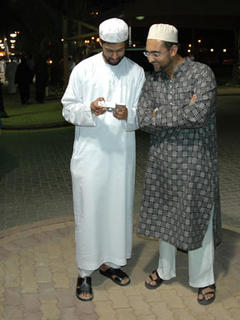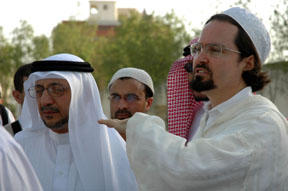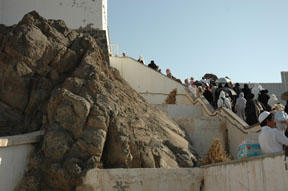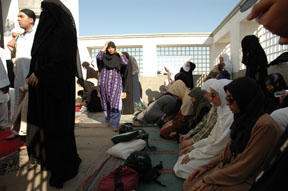Hanging onto Medina
 Photo: Rihla participants look through digital photographs as the group prepares to leave a banquet hosted by the Governor of Madinah.
Photo: Rihla participants look through digital photographs as the group prepares to leave a banquet hosted by the Governor of Madinah.© Fareena Alam. Please do not re-use without permission and proper credit.
I rushed home tonight in order to make it back on time to break my voluntary fast. Only 40 minutes until maghrib remained and I still had to help my mother prepare food and clean up the house. As the sun settled in and maghrib approached, my thoughts drifted back to Medina.
“I miss the adhan of Medina” I told my mom.
“It feels weird without it, doesn’t it?” my mother sympathized, reflecting back to her own childhood days in the Muslim world when the beautiful call to prayer would fill the skies and each person would leave whatever busied them and would quickly respond to the call for prayer.
“But it isn’t only the adhan”, I thought, “it’s the people, the shayukh, praying in his masjid (صلي الله عليه و سلم), being in the rawdah during the night hours - it’s everything and anything about Medina that I miss so much”.
I do everything I can to carefully recreate those moments for myself - from reading my litanies in the same order as I did in Medina to praying on the same prayer mat. Each day since I received the 2000 photographs DVD, I go through as many as I can with myself. After developing my favourite 50 photographs I placed them in my purse to be with me at all times, without exception. Throughout the day as I travel the buses and perform my daily routines, each time I run into a friend or an acquaintance I quickly pull out my photographs and offer to go through them with a short history lesson accompanying each photograph. It fails to tire me. I repeat the same stories, each time with equal, if not more, excitement and vigour. But sometimes the photographs are just not enough. Sometimes my memories of kissing the Blackstone and hanging on the multazam are not enough. Even tears are not enough because they won’t take me back.
People say that as the days go by the memories will fade and “things will return back to normal”. I irk each time I hear that because I just don’t want to go “back to normal”. In the end, our prayers will have to be enough. May He (swt) always keep these memories alive and may we all return again, soon, inshaAllah.
- Anonymous





